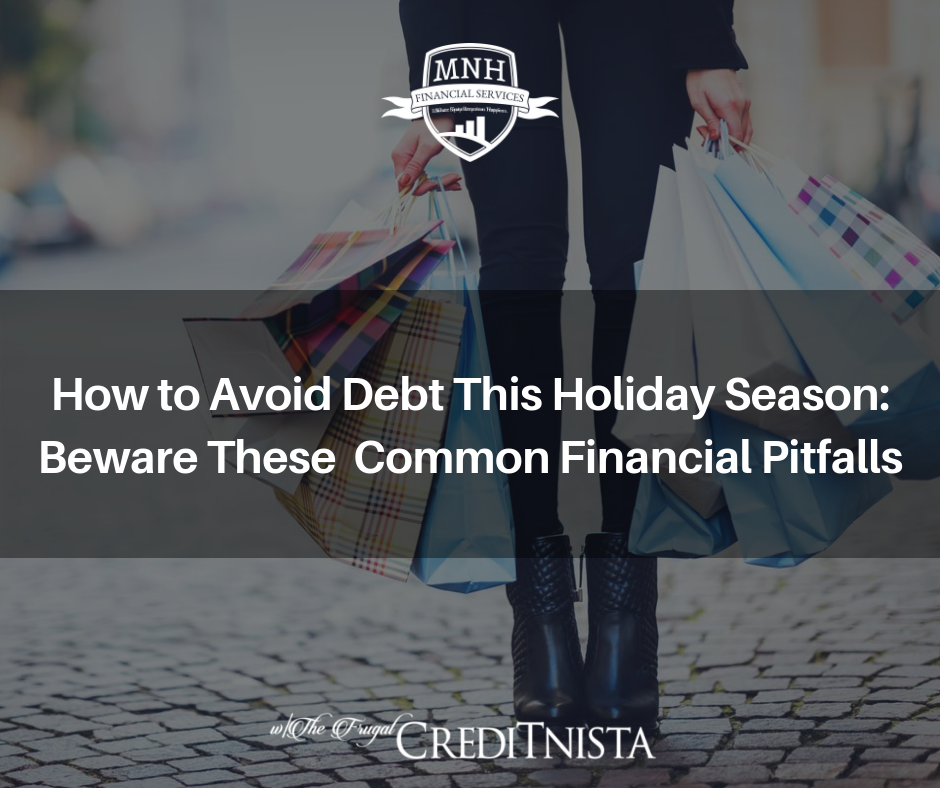Are you dreading a holiday hangover full of debt and despair? All your favorite stores and restaurants are having the sales of a lifetime, and it’s easy to get carried away buying for the people you love. But worrying about how to deal with all that holiday debt can stifle those feelings of goodwill.
Holiday memories shouldn’t come at a premium, especially if you’re already struggling financially to pay for daily expenses. I’m sharing some of the biggest financial black holes to avoid during the holidays so you aren’t stuck paying for the holiday season throughout the new year.
#1 – Not Setting a Holiday Spending Budget
Not setting a spending limit for the holidays will set you up for a financial meltdown. You might feel comfortable picking up a few gifts here and there, but when the bills come in for those gifts you may realize you spent more than you intended to.
It helps to make a list of all the people you need to buy gifts for, then dividing your spending limit between them. This can help you to avoid buying extra gifts just in case you forget someone. It also lets you realistically decide the gifts you can afford for each person on your list, rather than shopping based on requests or emotion.
#2 – Applying for Store Credit Cards
There’s no seemingly better time to apply for a store-specific credit card than the holidays. Most retailers offer a sizeable discount off your total purchase, which can certainly help you stretch your Christmas budget.
This is precisely what makes this so dangerous!
That discount may lure shoppers into spending more than they can immediately afford. And since store credit cards tend to have a higher APR, carrying a balance for even a month can erase any of the savings you get from the discount.
You’re almost always better off avoiding store credit cards while shopping for the holidays, (or any type of credit card, for that matter unless you are able to pay it off in full when you receive your billing statement) and paying only what you can afford at the time.
If you need extra time to pay for those must-have items, consider shopping at places that offer free layaway so you can make payments over time without interest.
#3 – Not Paying in Cash
You can avoid debt altogether when you pay in cash instead of credit cards. There have been numerous studies that show consumers with credit cards spend more than cash-paying customers. The money doesn’t feel “real” when you use a credit card, and digital transactions take away the pain associated with spending physical money.
Also, it’s easier to lose track of your spending when using credit cards. With cash, you have a real-time visual of your budget so you always know where your finances stand.
#4 – Not Shopping for Gifts Throughout the Year
Shopping for holiday gifts all year long can help ease the financial burden of a massive shopping spree in December. Rather than spending hundreds of dollars in a few short weeks, you can stretch out your shopping to avoid a financial crunch.
If you opt to do this next year, just remember to track what you spend and who you buy for. Otherwise, you may end up spending more than you need to because you forgot what you bought earlier in the year.
#5 – Not Sticking to a Shopping List
When you set out for your holiday shopping trips, do you have a list of what you intend to buy, or do you just wing it?
If you’re of the latter camp, you’re probably going to spend more than you intend to. Sticking with a shopping list can help you avoid the shiny bells and whistles that capture your attention, but you don’t really need. The less you buy on impulse, the less chance you have of sinking into unexpected debt.
Lists also help you visualize how much you’re buying so you can see where your money is going.
#6 – Focusing on Quantity Instead of Quality
Sure, a mountain of presents on Christmas morning will dazzle the eyes of any child, but the number of presents doesn’t matter in the long run. No one keeps count of how many gifts they receive. Instead, only purchases gifts they’ll be able to enjoy and not toss aside after using once or twice.
This rule doesn’t apply to just children, either. Buying one or two quality gifts is always better than going into debt trying to impress someone with quantity.
#7 – Overspending on the “Extras”

Those costs add up quickly. Some people justify buying expensive trees and decorations with the idea these things will last for years to come. While it’s true you can reuse most of these items, that shouldn’t be a green light to overspend on them.
While you’re crafting your holiday budget, also consider any little extras that also require money. Shop at dollar stores for your wrapping paper. Make your own gift tags, or just use a marker. Wait for half-off clearance sales after Christmas so you’ll be prepared for next year.
Some incidentals are unavoidable. Make room in your budget so you won’t be surprised with hidden expenses.
How to Avoid Debt: Give Freely Without Spending Excessively
It’s not about how much money you spend on someone during the holidays. In the end, the greatest joys can never be bought at a store. Focus on the spirit of giving rather than the spirit of spending, and you’ll be able to keep your finances in check and set yourself up for a prosperous New Year.
Happy Holidays!
Your Partner in Prosperity,
Netiva “The Frugal CrediTnista”














